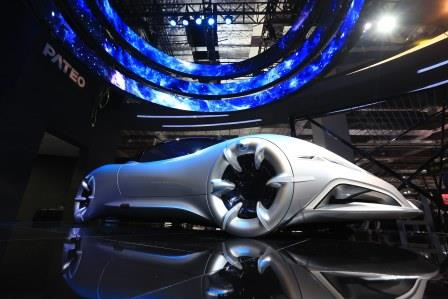
In the near future, you might be buying cars not from the usual automotive suspects, but from tech giants such as Apple and Google. And instead of you driving off in the car, the car will drive off with you.
Smart, driverless vehicles are emerging as the next big opportunity, with entrenched players, technology companies and start-ups jostling for a piece of the future pie. And China is taking a lead in this.
In fact, other modes of transport are also likely to pick up smarts and autonomy. As Chinadaily.com reported, “Trains and cars that drive themselves are just some of the things that are being developed with the aid of military technologies originally developed for combat use by the National University of Defence Technology [NUDT].”
NUDT has also collaborated with state-owned auto manufacturer FAW on commercial driverless cars that will soon be seen on the roads in China.
An early example of what might be zipping down Chinese roads was on display at last month’s Shanghai car show. Called Project N (for Newton, pictured), this concept car from communications company Pateo Group hides one key component — the steering wheel. In its place, you get a row of displays that would be more at home in a TV showroom. Even the sunroof and rear windshield double as displays that stream everything from traffic updates to what’s happening on your social networks. Meanwhile, an iris scanner handles security and a bevy of sensors do the driving. If you get bored of watching the car drive itself, you can pull out the steering wheel and take over.
Project N is expected to hit roads by 2018 and could cost from 350,000 yuan (about Dh200,000).
Hon Hai Precision Industry — better known as Foxconn — is known for manufacturing Apple products. Now, it is adding cars to the list. In March, the company announced a partnership with other big companies like Tencent — China’s biggest internet company and social networking platform — and China Harmony, the country’s largest auto dealership. While details are currently sketchy, the joint venture is expected to roll out cloud-linked smart electric cars priced under $15,000 (Dh55,000).
Alibaba has also entered the ring. The e-commerce giant has teamed up with SAIC Motor to launch a cloud-connected car as early as 2016. The companies have committed one billion yuan to this.
Chinese search leader Baidu also claims to be experimenting with autonomous cars, in collaboration with the Deep Learning Institute. It is testing cars that intelligently assist drivers rather than replace them for BMW.
It is just a matter of time before these cars start driving into markets outside the home country. So next time you see a vehicle neatly parking by itself, look closely — chances are it was made in China.







